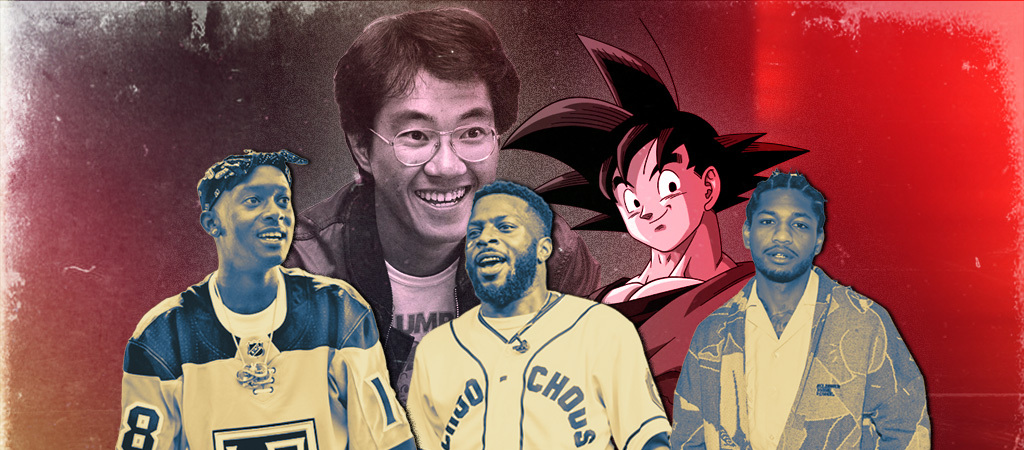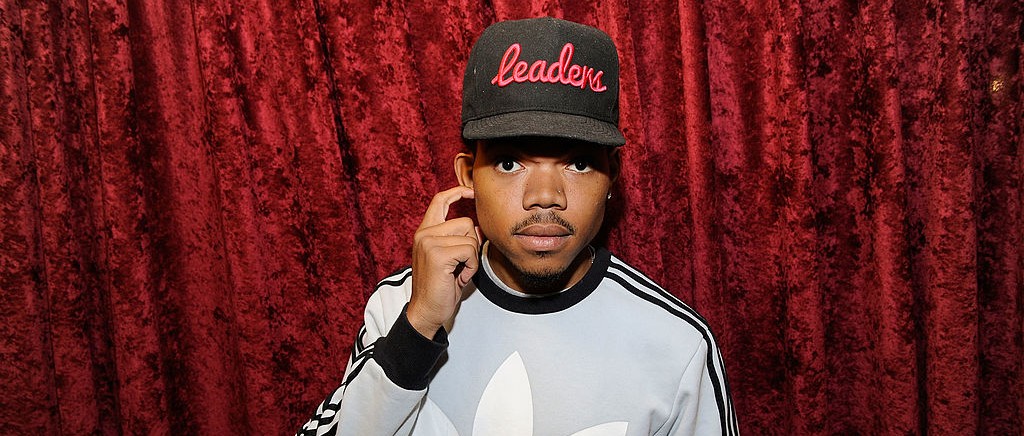
Contrary to popular belief, rappers – and hip-hop fans at large – have always been nerds. Look no further for proof than Wu-Tang Clan, ostensible stalwarts of hardcore, no-frills, gun-grime-and-crime street rap, who also chose a number of aliases from the world of Marvel Comics. Now, “nerds” isn’t here to demean anybody; after all, Pharrell Williams and Chad Hugo deliberately reclaimed the term for hip-hop heads with the name of both their experimental rock project, N.E.R.D., and their label, Star Trak (a direct reference to the OG geek obsession, Star Trek).
But just in case none of that was enough to convince you that hip-hop culture and geekdom are as inextricably tied together these days as politics and corruption, just look at the outpouring of admiration, grief, and respect from rappers and their fans for the late Japanese comics creator, Akira Toriyama, upon the news of his death last week — and for his unintended but undeniable contributions to the culture through his best-known work, Dragon Ball. Incidentally, I wrote just last month about the sprawling impact of anime on hip-hop, and much of that — I’m talking a good 80 percent or better — is very likely due to the popularity of Dragon Ball. Toriyama may well have created the most hip-hop anime of all time.
Oakland rapper Guapdad 4000 summed it up best in his extensive tribute to Toriyama on Twitter when he wrote, “NGL, Toriyama passing feel like I lost a real family member. This shit worse than when Micheal Jackson died.” Some version of this sentiment was shared across the rap landscape, from the expected, like Thundercat, who once paid tribute to the series with his tongue-in-cheek single “Dragonball Durag,” to the more subtle, like Big Sean recording a freestyle verse with the film Dragon Ball Z: Resurrection ‘F’ on television in the background.
That foundational love for the franchise permeated each of the conversations I had with rappers ranging from Grammy favorite Cordae to Top Dawg Entertainment mainstay Isaiah Rashad to my fellow Comptonite Buddy. Although Dragon Ball isn’t ostensibly about hip-hop, nor most of the subjects with which rap music historically concerns itself, all of them considered the franchise a profound inspiration to their lives and art. Even beyond that, they each saw a reflection of themselves in characters like Goku and Vegeta, who they even likened to the fractious history of Blackness in America.
Just in case you have by some chance been stranded on a desert island with only a volleyball for company for the past thirty years, Dragon Ball is one of the most successful Japanese entertainment franchises of all time. It encompasses comics (manga), animated television shows and movies (anime), video games, which Cordae calls his introduction to the franchise, and mountains of merch from t-shirts (oft-derided in the early days) to action figures, accessories, and even cafes in its native Japan where fans could dine on themed cuisine inspired by the aesthetics dreamed up by Akira Toriyama over the franchise’s 31-year history.
Toriyama had previously worked on a book called Dr. Slump before creating Dragon Ball in 1984 out of a desire to write a kung-fu shonen (or boys’) manga. Shonen manga revolve around action and adventure tales about heroes who often hold goals of self-improvement and being “the best” at something or finding some MacGuffin. Dragon Ball, loosely based on the Chinese classical novel Journey To The West, has the best of both in the form of protagonist Son Goku, who searches for the seven titular balls that will grant the holder one wish from a mighty dragon.
The manga became so popular that it spawned five anime series, the second of which, Dragon Ball Z, was aired in the US twice. The first time, in syndication, it garnered a small but loyal fanbase despite numerous edits for content and a season order that cut off in the midpoint of the second season (a source of unending frustration for this writer). However, in 1998, the show began running on Cartoon Network’s afternoon Toonami programming block, increasing the show’s popularity stateside tremendously. It was many American children’s first experience with the concept of “anime” as Japanese cartoons.
After a redubbed airing continued the story beyond that original loop of 53 episodes, anime became an obsession at an unheard-of scale. This is the one most of the rappers I interviewed were most familiar with, but Cordae admits to being a fan even of the widely derided sequel series Dragon Ball GT. “I know a lot of people shit on GT, but that sh*t was tight to me,” he maintains. “I remember I watched Bio-Broly. That was one of the first movies I got from Blockbuster!” Still, DBZ is such an important part of his life, he’s even wearing a T-shirt in his breakout video for “My Name Is.”
Meanwhile, Toriyama’s distinctive character designs – those square eyes, that spiky hair – graced the graphics of a handful of popular video game franchises throughout the rest of the ‘90s and early 2000s. Dragon Quest and Chrono Trigger are popular in their own rights, with many gamers holding them among the best of their genre and generation. Still, Dragon Ball and its sequels and spinoffs remain Toriyama’s best-known and most beloved works – especially when it comes to hip-hop.
Buddy recalled catching the show at home (off of Harlan and Alondra, the two streets after which he named his 2018 debut album) on Toonami, “fresh from playing basketball outside, hoopin’, skatin’, climbing trees.” Describing his recipe for the ultimate syrup sandwich, he says he watched Dragon Ball Z, Inuyasha, and Cowboy Bebop in the afternoons. “Goku was my favorite, ‘cause that n**** be kickin’ ass and makin’ friends,” he enthuses. “Everybody he beat up, he’s homies with!”
Today, multiple rappers litter their rhymes with phrases from the show such as “going Super Saiyan,” a reference to a power some of the franchise’s characters can tap into to reach an empowered state complete with a flaming aura and golden hair. Florida rapper Denzel Curry name-checks Senzu beans — a restorative food eaten by the Dragon Ball heroes — and Broly, a villain from the 11th film, Dragon Ball Z: Broly – The Legendary Super Saiyan on 2015’s “Ultimate,” his breakout hit. Chance The Rapper throws out a reference to both the Super Saiyan state and one of the franchise’s many sidekick characters, Krillin, in his 2016 song “Blessings.”
Big Sean once fanned out when he and his mother met Sean Schemmel, the American voice actor for Goku and several other characters on Dragon Ball Z. Thundercat, best known for his work with Kendrick Lamar, recruited Guapdad 4000 and rapper Smino to rap on the “Dragonball Durag” remix in 2020. The video for the song sees ‘Cat trying to woo the Haim sisters adorning with the eponymous hair accessory and the resulting repulsion of (most) of his targets — a reference to the confusion faced by the franchise’s earliest American adopters.
There’s still some of that old embarrassment lingering through some of my conversations with the rappers, even though we’re all here for the same thing. Isaiah Rashad apologizes for “nerding out,” but needs very little encouragement to continue doing so. Mostly, though, these are some of the most enthusiastic interviews I’ve had in seven years at Uproxx. Ask rappers questions about the music, you might get one-word answers; ask them about Akira Toriyama and the impact that Dragon Ball has had on them, it’s like they ate a Senzu bean.
Even as Rashad frets that his musing gone too far afield, he credits his exposure to the wider world through Dragon Ball and other anime. They gave him an outgoing curiosity for other cultures – even ones that weren’t strictly connected to the franchise. “When you grow up in a Black household,” he says, “What your parents like, you like. So when you see something else that you really respect as much as you respect people that look like you… that got me into all kinds of different music like funk, live renditions of the music… I got hella influences. I love Thai funk. Dragon Ball is how I got into a lot of that.”
The aspects of the show that draw such energetic admiration from these entertainers vary as widely as their approaches to rap. Buddy loves the bond between the green alien Piccolo and Goku’s son Gohan, who takes up the battle to save the earth from extraterrestrial threats after his father’s death (don’t worry, he gets better). “I loved watching Piccolo and Gohan bond,” he gushes. “Uncle Piccolo, raising Gohan in the wilderness, training him, making sure he was book smart.”
Meanwhile, Cordae found himself fascinated by the world-building in an arc involving intergalactic supervillain Frieza. “It was like a caste system of just how you got your lower level, just army guys with the guns,” he explains. “Then you got your Dodoria, Zarbon, then you got your Ginyu Force. I just love the clear pecking order of how strong everybody was.” He says that Dragon Ball Z “was the one anime that was socially acceptable in the hood. When people ask me, am I an anime head? I’m like, ‘Nah, I just like the n**** anime, bro, just like Naruto and Dragon Ball Z.’”
A common throughline is how much the world of Dragon Ball reflects social issues, despite being technically apolitical. Cordae compares the Saiyans to Black Americans, calling Frieza a racist for his treatment of the group, which he employs as enforcers to carry out his dirty work. Buddy makes the same comparison to the planet Namek, which Piccolo calls home. Rashad notes that the prolific variety of character types and species made them relatable because “you didn’t know what the f*ck they was, you just know they was cool-looking.”
But sometimes, the love for Dragon Ball and Akira Toriyama was as simple as giving young Black kids something to do when it felt like America didn’t provide very many other options – let alone ones enforcing positive messages about getting stronger, turning enemies into friends, and never giving up no matter the odds. As Guapdad put it in his loving tribute to Toriyama, “Dragon Ball Z literally saved me from just going back outside and ending up a street n****. I know this sounds like a stretch but I’m not kidding bruh. Toonami played it right when the streetlights came on.”
I asked everybody I interviewed for this piece what they’d want to tell Toriyama given the chance. Rather than words, they all shared another similar sentiment. “I would give him a big ass hug,” says Cordae. “I’d try to draw him, embrace my inner eight-year-old,” Rashad echoes. “I wouldn’t say anything,” Buddy admits. “I’d give him a fist bump. Then a side hug. And then it’d be an obsessed grab with a head on the shoulder.” They all say they’d tell him “thank you.”
Thank you for creating a world we could escape to. Thank you for giving us characters we could relate to. Thank you for inspiring our creativity, for expanding our horizons, and for telling us there is no limit to the power inside of us if we only keep pushing. Thank you for one hell of an adventure.

